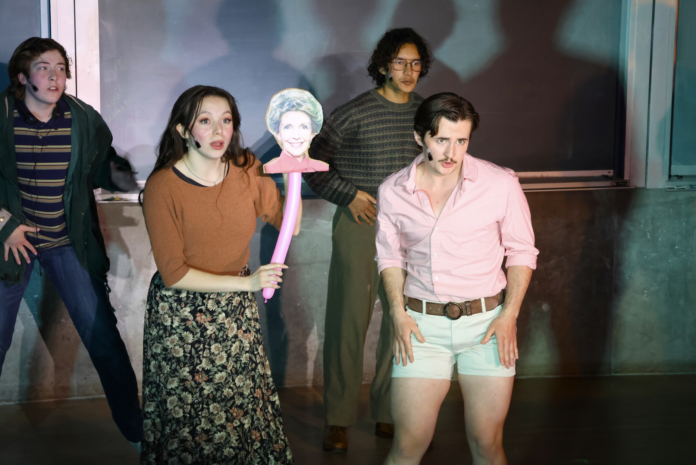The student-run theater group brought the Broadway show to UC Davis students and local community
BY SHREYA KUMAR — arts@theaggie.org
From Feb. 28 to Mar. 2, the UC Davis student theater group, Studio 301, rose to the challenge, delivering the Broadway original production of “Falsettos” with humor, heartbreak and a whole lot of heart.
Under the direction of Isabella Ku, a fourth-year animal science major, the talented cast and creative team brought the show’s intricate score and complex characters to life in a way that left the audience spellbound each night.
“Falsettos” opened on Broadway in 1992, earning rave reviews and seven Tony Award nominations, taking home the award for “Best Original Score.” It gained even more recognition and popularity after the 2016 revival, starring Christian Borle, Andrew Rannells and Stephanie J. Block. Set in the late 1970s and early 1980s, “Falsettos” follows a family that falls apart when the father, Marvin, divorces his wife, Trina, to be with his male lover, Whizzer. As Marvin and Trina attempt to maintain a sense of normalcy for their son, Jason, the dynamics of their unconventional family become increasingly complicated as they have to face more and more obstacles together.
The musical’s first act is filled with sharp humor and rapid-fire dialogue, while the second act takes a more somber and introspective turn as the family tries to come together to prepare Jason’s bar mitzvah with the acquired immunodeficiency syndrome (AIDS) crisis looming in the background. Throughout it all, the show explores the complexities of love, acceptance and the work that goes into building a family.
At the time of its release, the way the play tackled the prominent themes of Jewish heritage, gender roles, LGBTQ+ identity and the impact of the AIDS crisis made it truly groundbreaking. On top of that, the story portrays a family that practices Reform Judaism, a branch of Judaism that was still developing and shifting at the time of its writing. With so many complex themes, “Falsettos” is an ambitious choice for any theater organization.
“In this political climate, I think it’s especially important to represent queer and Jewish culture in the art,” Ku said. “I didn’t foresee this [political climate] when I submitted the idea to do this musical, but I think it’s especially meaningful now, and I hope it resonates with the audience.”
Due to the complex content in the story, the cast and crew took every step to make sure they were being as accurate and faithful in their depiction of the characters as possible. Adira Zylberman, a first-year undeclared major and a choreographer for Studio 301, gave a presentation to the organization to educate them on Jewish culture and practices in preparation for the production.
“As someone who is also Jewish, I felt like it was really important to make sure everything was done right and with care and respect,” Zylberman said. “I applaud the Studio 301 team for giving us the space to be heard and for being so committed to authenticity.”
Josh Velazquez, a fourth-year statistics major who portrayed the male lead, discussed the process of ensuring the production’s authenticity and accuracy.
“We did a lot of listening, a lot of understanding, a lot of talking about Jewish history and that helped us to understand the characters better, ” Velazquez said.
What made this production of “Falsettos” truly special was the resourcefulness and passion of the entire Studio 301 team. This quarter’s production took place in Social Science 1100 lecture hall, a venue significantly smaller than a traditional theater stage. Despite the space limitations, the crew maximized every inch, transforming the lecture hall into an immersive environment.
The stage design featured minimal but strategic set pieces, allowing the actors to transition fluidly between scenes while keeping the focus on their performances. Cast members frequently engaged with the audience by entering the seats or walking through the aisles, adding a layer of intimacy to the production that made the emotional beats hit harder. The professional sound design and lighting contributed to the theatrical experience, further elevating the production’s quality into a professional, immersive experience.
“I like to say since we’re on a student-run team, we’re also on a student-run budget,” Ku said. “We rely heavily on donations and ticket sales, and the majority of our budget went into getting the rights for ‘Falsettos’ alone. We actually got a lot of help from the Aggie Reuse Store, which helped us to get a majority of the clothes we used in costuming for free. We also traditionally perform in lecture halls to save on costs, but I think we’re getting the hang of it.”
The actors put on soulful, relatable performances that had the audience laughing out loud one minute and tearing up the next, signifying that Studio 301 had successfully brought “Falsettos” to life in a way that resonated deeply with its viewers.
With its heartfelt performances, inventive staging and professional-caliber technical execution, this production was certainly a testament to the dedication, talent and passion of everyone involved in making it happen. If you missed “Falsettos” but want to support Studio 301, follow their Instagram account, @studio301productions, or visit their website to get involved or to learn more information about their upcoming productions.
Written by: Shreya Kumar — arts@theaggie.org





